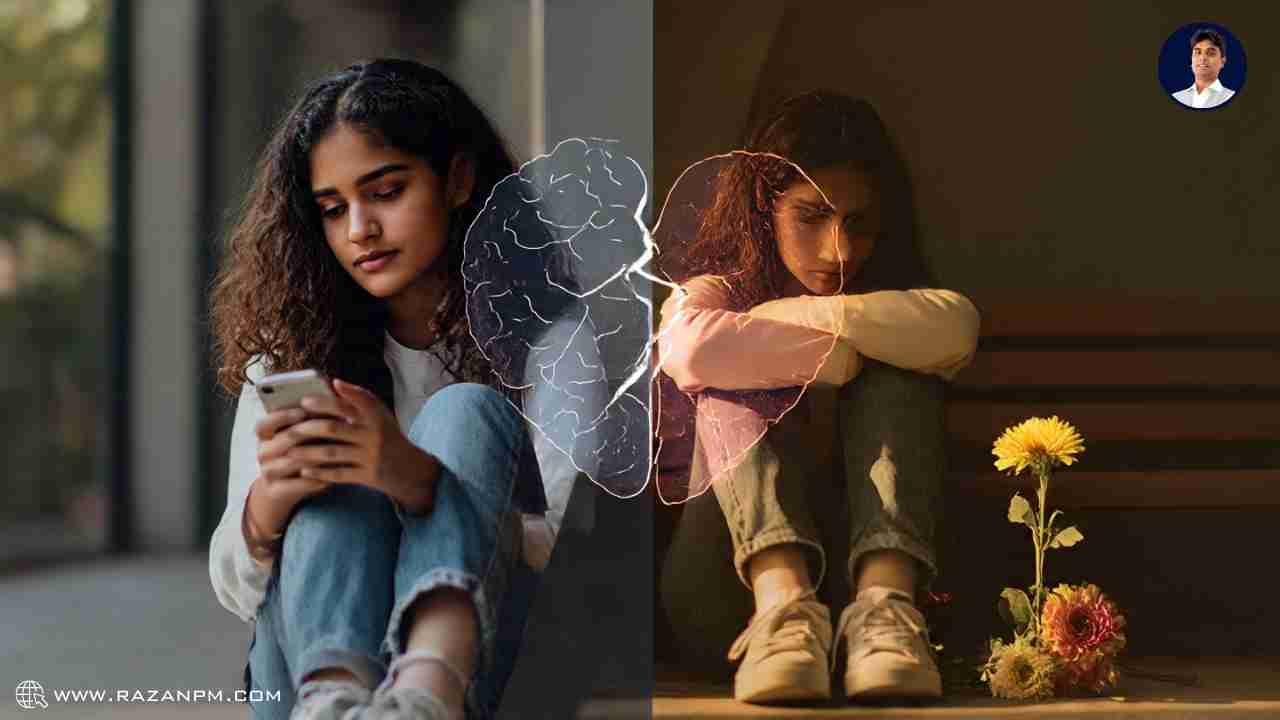Have you ever sent that brave little message — “I love you” — and then waited?
And waited...
And waited some more…
Only to see no reply, no “seen,” no blue tick — just silence louder than thunder?
It starts small — a tiny pause in a chat — but the mind? Oh, it’s a Bollywood-level scriptwriter!
“Did they ignore me?”
“Are they talking to someone else?”
“Was I too much? Too soon?”
Before you know it, that single unread message turns into a full-blown emotional thriller inside your head.
And guess who’s playing the villain? — Your own thoughts.
As a Counsellor, I’ve seen this hundreds of times:
a single moment of silence becomes the trigger for self-doubt, anxiety, and emotional trauma.
also read: how fear of rejection kills realconnection

People often tell me in therapy,
“Doctor, it felt like my heart got left on ‘read.’”
or
“I kept checking my phone every two minutes like it owed me closure.”
When love is expressed but not returned, the mind doesn’t just feel sad — it feels rejected, invisible, and not enough.
You start questioning your worth, replaying every word you said, every emoji you used, trying to decode silence.
And sometimes, that silence hurts more than a “no.”
Because “no” gives closure.
But silence? It creates a vacuum where imagination breeds pain.
also read: why timing turns simple talks intobig arguments

Clinically, this pattern is often linked to rejection sensitivity, anxious attachment, or emotional trauma response.
also read: how everyday pressure breaks yourmind?
From a Counsellor perspective, the reaction to emotional rejection can sometimes resemble symptoms seen in:
1. Adjustment Disorder (DSM-5, ICD-11):
When an individual experiences emotional or behavioral distress within 3 months of a stressful event — like rejection or heartbreak.
2. Anxious Attachment Patterns (from Attachment Theory):
People with anxious-preoccupied attachment often feel unsafe when affection isn’t reciprocated. Silence feels like abandonment.
3. Rejection Sensitivity Dysphoria (RSD):
A term often discussed in neuropsychology where perceived rejection triggers intense emotional pain — even if it wasn’t intentional.
These aren’t just “emotional” issues — they’re neurological, hormonal, and deeply psychological.
When the brain perceives rejection, it activates the same pain centers as physical injury.
That’s why heartbreak “hurts.” It’s not poetic; it’s biology.
also read: do voice notes kill realconversations?

A Harvard study (Eisenberger et al., 2003) found that social rejection activates the anterior cingulate cortex — the same area triggered by physical pain.
Meaning, emotional rejection is literally felt in your body.
Another study published in the Journal of Personality and Social Psychology (Leary, 2015) linked unreciprocated love with increased cortisol (stress hormone) levels and temporary cognitive fog — explaining why you can’t focus or sleep.
So when someone says,
“It’s just one message, move on!”
you can tell them —
“Actually, it’s my neurochemistry doing somersaults right now!” 😅
also read: how bias turns into deep depression?
Let me share something from one of my sessions (name changed for privacy).
A young woman, Rhea, came to me heartbroken.
She’d confessed her feelings to her best friend — only to receive silence.
No reply. No acknowledgment. Just… nothing.
She said,
“I keep checking my phone. I feel like a fool. I can’t even hate him, I just hate myself.”
We began working on understanding her emotional pattern — not his silence, but her reaction to it.
Over weeks, she learned something powerful:
“His silence wasn’t my rejection; it was his confusion.”
That shift — from personal pain to emotional perspective — changed her healing journey.
She learned to separate her worth from someone else’s response.
And that’s the heart of recovery:
Realizing silence doesn’t define your value.
also read: how to tell if emotional separationhas already started?

Here’s a small yet powerful practice I give my clients — it helps you reclaim peace in moments of emotional silence.
Step 1: Take aotebook or open your notes app.
Step 2: Write a letter starting with “I love you, and it’s okay if you can’t say it back.”
Step 3: Pour everything you feel — hurt, hope, confusion, gratitude. Don’t hold back.
Step 4: End it with: “I release this expectation with love.”
Step 5: Delete or burn the note (safely).
This isn’t about letting go of the person — it’s about releasing the emotional hold their silence has on your peace.
Writing is cathartic; it engages the prefrontal cortex (the rational brain) and calms the amygdala (the emotional brain).
Many clients say it feels like taking a deep breath after drowning in emotions.
Try it once tonight — no pressure, just honesty. ❤️
also read: why kind words create misunderstanding?
Of course, this is just the beginning.
Healing from unreciprocated love involves deeper guided steps —
like understanding your attachment style, reframing self-talk, and learning emotional regulation techniques.
Because sometimes, it’s not about the person who didn’t reply —
it’s about the inner child inside you who feared being ignored.
Those silent emotional wounds can heal — with awareness, guided therapy, and self-compassion.
also read: how caregiving triggers hidden depression?
If this story feels familiar, please know this —
you don’t have to carry the silence alone.
Every unreturned “I love you” can become the start of deeper self-love and emotional freedom.
If your mind feels heavy and your heart tired, I’m here to listen, guide, and help you rebuild your emotional balance.
✨ Book your personal consultation here ✨
Let’s work together to heal the silence — and help you fall in love with yourself again.
👉 Begin Your Journey with a 1 on 1 Consultation
👉 Begin Your Journey with a 1 on 1 Consultation

When you say “I love you” and get no reply, your brain registers it like a rejection.
Psychologically, the same pain centers (the anterior cingulate cortex) activate as they do in physical pain.
That’s why even one unread message can feel like heartbreak — it’s not drama, it’s neurobiology.
also read: how fibromyalgia fuels hiddendepression?
Start by acknowledging your feelings instead of suppressing them. Journaling, meditation, and therapy can help you express the pain safely.
Most importantly, understand — their silence says nothing about your worth.
Healing begins when you stop tying your value to someone else’s response.
also read: why saying i love you is not enough?
Yes. Prolonged one-sided love or emotional rejection can trigger symptoms of Adjustment Disorder — like anxiety, mood swings, and overthinking.
If these symptoms persist for more than a few weeks, it’s important to consult a Counsellor for emotional guidance and support.
also read: why emotional intimacy feels unsafefor some partners?
People often stay silent not out of cruelty, but confusion or fear of commitment.
Some don’t know how to respond, and silence feels “safer” than hurting you.
Understanding this helps you detach emotionally instead of internalizing blame.
also read: how hormonal shifts can triggerdepression?
Try grounding techniques like deep breathing, mindfulness, or the Write and Release exercise mentioned in this blog.
Redirect your thoughts from “Why didn’t they reply?” to “How can I feel peaceful right now?”
Remember — peace is a daily practice, not a one-time decision.
also read: how chronic pain fuels depression atany age?
If you’ve been feeling numb, anxious, or emotionally stuck for over two weeks — or if your self-worth depends on someone’s response — therapy can help.
A psychologist can help reframe your emotional patterns and rebuild healthy self-esteem.
also read: when silence turns intomisunderstanding?
A Counsellor helps by identifying emotional triggers, improving your attachment style, and teaching tools for emotional regulation.
Therapy creates a safe space to express, release, and rebuild your confidence without judgment.
